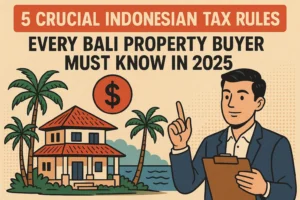5 Crucial Indonesian Tax Rules Every Bali Property Buyer Must Know in 2025

Discover the 5 crucial Indonesian Tax Rules every Bali property buyer must know in 2025. Learn about transfer taxes, income tax, VAT, annual property tax, and foreign ownership regulations to ensure a smooth and compliant property purchase in Bali.
In this article, we will explore the 5 most crucial Indonesian tax rules every Bali property buyer must familiarize themselves with in 2025. From transfer taxes to income tax implications, this guide covers the essentials. We also include useful external resources for comprehensive information and legal advice.
1. Tax Rules on Property Acquisition: Duty on Title Transfer (Bea Perolehan Hak atas Tanah dan Bangunan – BPHTB)
One of the first tax rules to know when buying a property in Bali is the Bea Perolehan Hak atas Tanah dan Bangunan (BPHTB), or the duty on the acquisition of land and building rights. This tax is applied when a property title is transferred from the seller to the buyer.
- Current Rate: BPHTB is generally set at 5% of the transaction value or the appraised value, whichever is higher.
- Tax Base: The taxable value is the transaction price minus the non-taxable threshold, which varies by region. In Bali, this threshold amount is set by the local government.
- Timing: The BPHTB must be paid before the property title is officially registered in the buyer’s name.
Understanding this tax rule helps buyers prepare for additional costs beyond just the purchase price. Sellers sometimes pass this cost to buyers in the negotiation. Contact Pure Land for further guide.
For the latest guidelines, visit the official Indonesian Tax Office website: Directorate General of Taxes (DJP) – BPHTB.
2. Income Tax (PPh) on Property Transactions: Seller and Buyer Responsibilities
The Indonesian tax system imposes income tax (Pajak Penghasilan or PPh) on property sale transactions. Different taxes apply to the seller and sometimes to the buyer, and these tax rules are key to ensuring compliance:
- Seller’s PPh (Article 4(2)): Sellers must pay a final income tax of 2.5% of the gross transaction value. This tax is withheld by the buyer and paid to tax authorities.
- Buyer’s PPh (Article 22): Sometimes, buyers are required to pay withholding tax of 5% for certain seller types (such as companies), but individual buyer PPh obligations vary.
Buyers must ensure the tax withholding on the seller’s behalf is documented correctly to avoid legal complications. Failure to withhold or declare taxes can result in fines or penalties. Contact Pure Land for best option.
For comprehensive details, see the official resource here: PPh on Property Transactions – Indonesian Tax Office.
3. Value Added Tax (VAT) and Property Sales: When Does VAT Apply?
Another critical tax rule to understand is the application of Value Added Tax (VAT or PPN) on property sales in Indonesia:
- Residential land and housing sales are generally exempt from VAT, but commercial properties might attract VAT at a rate of 11% (updated in 2022 from 10% to 11%).
- Developers selling new properties and commercial real estate must usually charge VAT.
- Buyers of commercial properties in Bali should verify VAT applicability during the transaction to prevent surprises.
VAT compliance affects the total cost of acquisition and should be factored into your financial plans, especially for investment purchases.
More about VAT regulations can be found at: VAT on Property – Directorate General of Taxes.
4. Annual Property Taxes (PBB): What Bali Property Owners Must Pay
Once the property transfer is complete, the buyer becomes responsible for annual property taxes known as Pajak Bumi dan Bangunan (PBB):
- Rate: The PBB rate is a modest percentage of the taxable property value (usually around 0.5% of the NJOP—the government-assessed value).
- Payment: PBB is paid annually to the local government and is crucial for keeping property ownership in good standing.
- Non-Compliance: Failure to pay PBB can result in fines and difficulty with future transactions or legal claims.
PBB is often overlooked by foreign buyers but remains an important ongoing tax obligation in Indonesian property ownership.
For details on PBB and how to pay it in Bali, refer to: Indonesian Property Tax – Ministry of Finance.
5. Foreign Ownership Tax Rules and Restrictions on Bali Property Buyers
Foreigners seeking property in Bali face specific tax rules and legal restrictions under the Indonesian ownership system:
- Foreign individuals cannot directly own freehold land. Instead, they may acquire property via long-term lease or “Hak Pakai” (right to use).
- Tax implications differ based on the ownership type, requiring careful tax planning.
- Income from leased properties may also incur withholding taxes or income tax if rented out.
- Proper structuring with local legal and tax experts is crucial to remain compliant and optimize tax liability.
The Indonesian government periodically updates laws impacting foreign ownership, so consult with legal advisors for the latest rules.
You don’t have to worried about, Pure Land client is mostly foreign.
Learn more about foreign ownership and tax considerations at: Foreign Property Ownership in Indonesia – Indonesia Investments.
 Conclusion: Master These Tax Rules Before Buying Property in Bali
Conclusion: Master These Tax Rules Before Buying Property in Bali
Understanding these 5 crucial Indonesian tax rules related to property acquisition—BPHTB, income tax on transactions, VAT, annual property tax (PBB), and foreign ownership tax regulations—is essential for any Bali property buyer in 2025. These rules impact your costs, legal standing, and future investment returns.
Before purchasing, always conduct due diligence with qualified tax professionals and legal advisors familiar with Bali’s property market and Indonesian tax laws. Proper planning around these tax rules will ensure a smooth property acquisition process and protect your investment in paradise.

 Conclusion: Master These Tax Rules Before Buying Property in Bali
Conclusion: Master These Tax Rules Before Buying Property in Bali